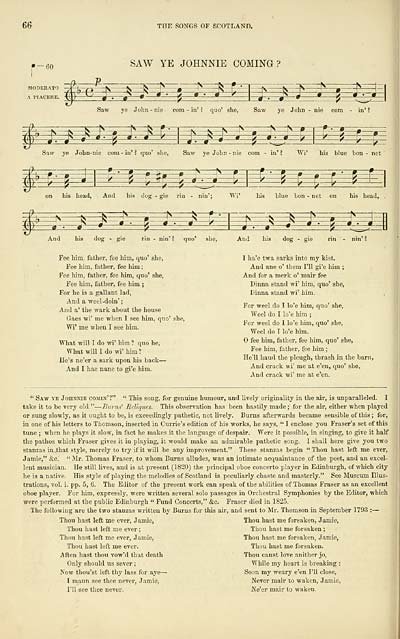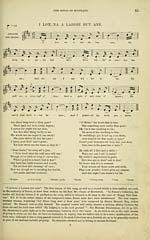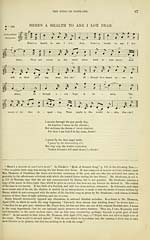Glen Collection of printed music > Printed music > Wood's edition of the songs of Scotland
(90) Page 66 - Saw ye Johnnie coming
Download files
Complete book:
Individual page:
Thumbnail gallery: Grid view | List view

66
THE SONGS OF SCOTLAND.
' = 60
SAW YE JOHNNIE COMING?
MODEEATO
A PIACERE.
^te^^ag^§=3=S^^
Saw ye John - nie com - in' ? quo* she, Saw ye John -nie com - in'?
S3?
: *=S
m
- > > p -
V—^— ft
=s=^
S ^JzO ^
-*=>
Saw ye John-nie com - in' ? quo' she, Saw ye John - nie com - in' ? Wi' his blue bon - net
\= ^=&^ =^ ^m^^m
t^=*~
w^-t
on his head, And his dog - gie rin - nin'
his blue bon - net on his head.
SEES
£=^
^
And his dog
rin - nin'? quo' she, And his dog - gie rin
Fee him, father, fee him, quo' she,
Fee him, father, fee him ;
Fee him, father, fee him, quo' she,
Fee him, father, fee him ;
For he is a gallant lad,
And a weel-doin' ;
And a' the wark about the house
Gaes wi' me when I see him, quo' she,
Wi' me when I see him.
What will I do wi' him ? quo he,
What will I do wi' him ?
He's ne'er a sark upon his back —
And I hae nane to gi'e him.
I ha'e twa sarks into my kist.
And ane o' them I'll gi'e him ;
And for a merk o' mair fee
Dinna stand wi' him, quo' she,
Dinna stand wi' him.
For weel do I lo'e him, quo' she,
Weel do I lo'e him ;
For weel do I lo'e him, quo' she,
Weel do I lo'e him.
fee him, father, fee him, quo' she,
Fee him, father, fee him ;
He'll baud the plough, thrash in the barn,
And crack wi' me at e'en, quo' she,
And crack wi' me at e'en.
" Saw ye Johnnie comin'?" " This song, for genuine humour, and lively originality in the air, is unparalleled. I
take it to be very old." — Burns' Beliques. This observation has been hastily made ; for the air, either when played
or sung slowly, as it ought to be, is exceedingly pathetic, not lively. Burns afterwards became sensible of this ; for,
in one of his letters to Thomson, inserted in Currie's edition of his works, he says, " I enclose you Fraser's set of this
tune ; when he plays it slow, in fact he makes it the language of despair. Were it possible, in singing, to give it half
the pathos which Fraser gives it in playing, it would make an admirable pathetic song. I shall here give you two
stanzas in .that style, merely to try if it will be any improvement." These stanzas begin " Thou hast left me ever,
Jamie," &c. " Mr. Thomas Fraser, to whom Burns alludes, was an intimate acquaintance of the poet, and an excel-
lent musician. He still lives, and is at present (1820) the principal oboe concerto player in Edinburgh, of which city
he is a native. His style of playing the melodies of Scotland is peculiarly chaste and masterly." See Museum Illus-
trations, vol. i. pp. 5, 6. The Editor of the present work can speak of the abilities of Thomas Fraser as an excellent
oboe player. For him, expressly, were written several solo passages in Orchestral Symphonies by the Editor, which
were performed at the public Edinburgh " Fund Concerts," &c. Fraser died in 1825.
The following are the two stanzas written by Burns for this air, and sent to Mr. Thomson in September 1793 : —
Thou hast left me ever, Jamie, Thou hast me forsaken, Jamie,
Thou hast left me ever ; Thou hast me forsaken ;
Thou hast left me ever, Jamie, Thou hast me forsaken, Jamie,
Thou hast left me ever. Thou hast me forsaken.
Aften hast thou vow'd that death Thou canst love anither jo,
Only should us sever ; While my heart is breaking :
Now thou'st left thy lass for aye — Soon my weary e'en I'll close,
I maun see thee never, Jamie, Never mair to waken, Jamie,
I'll see thee never. Ne'er mair to waken.
THE SONGS OF SCOTLAND.
' = 60
SAW YE JOHNNIE COMING?
MODEEATO
A PIACERE.
^te^^ag^§=3=S^^
Saw ye John - nie com - in' ? quo* she, Saw ye John -nie com - in'?
S3?
: *=S
m
- > > p -
V—^— ft
=s=^
S ^JzO ^
-*=>
Saw ye John-nie com - in' ? quo' she, Saw ye John - nie com - in' ? Wi' his blue bon - net
\= ^=&^ =^ ^m^^m
t^=*~
w^-t
on his head, And his dog - gie rin - nin'
his blue bon - net on his head.
SEES
£=^
^
And his dog
rin - nin'? quo' she, And his dog - gie rin
Fee him, father, fee him, quo' she,
Fee him, father, fee him ;
Fee him, father, fee him, quo' she,
Fee him, father, fee him ;
For he is a gallant lad,
And a weel-doin' ;
And a' the wark about the house
Gaes wi' me when I see him, quo' she,
Wi' me when I see him.
What will I do wi' him ? quo he,
What will I do wi' him ?
He's ne'er a sark upon his back —
And I hae nane to gi'e him.
I ha'e twa sarks into my kist.
And ane o' them I'll gi'e him ;
And for a merk o' mair fee
Dinna stand wi' him, quo' she,
Dinna stand wi' him.
For weel do I lo'e him, quo' she,
Weel do I lo'e him ;
For weel do I lo'e him, quo' she,
Weel do I lo'e him.
fee him, father, fee him, quo' she,
Fee him, father, fee him ;
He'll baud the plough, thrash in the barn,
And crack wi' me at e'en, quo' she,
And crack wi' me at e'en.
" Saw ye Johnnie comin'?" " This song, for genuine humour, and lively originality in the air, is unparalleled. I
take it to be very old." — Burns' Beliques. This observation has been hastily made ; for the air, either when played
or sung slowly, as it ought to be, is exceedingly pathetic, not lively. Burns afterwards became sensible of this ; for,
in one of his letters to Thomson, inserted in Currie's edition of his works, he says, " I enclose you Fraser's set of this
tune ; when he plays it slow, in fact he makes it the language of despair. Were it possible, in singing, to give it half
the pathos which Fraser gives it in playing, it would make an admirable pathetic song. I shall here give you two
stanzas in .that style, merely to try if it will be any improvement." These stanzas begin " Thou hast left me ever,
Jamie," &c. " Mr. Thomas Fraser, to whom Burns alludes, was an intimate acquaintance of the poet, and an excel-
lent musician. He still lives, and is at present (1820) the principal oboe concerto player in Edinburgh, of which city
he is a native. His style of playing the melodies of Scotland is peculiarly chaste and masterly." See Museum Illus-
trations, vol. i. pp. 5, 6. The Editor of the present work can speak of the abilities of Thomas Fraser as an excellent
oboe player. For him, expressly, were written several solo passages in Orchestral Symphonies by the Editor, which
were performed at the public Edinburgh " Fund Concerts," &c. Fraser died in 1825.
The following are the two stanzas written by Burns for this air, and sent to Mr. Thomson in September 1793 : —
Thou hast left me ever, Jamie, Thou hast me forsaken, Jamie,
Thou hast left me ever ; Thou hast me forsaken ;
Thou hast left me ever, Jamie, Thou hast me forsaken, Jamie,
Thou hast left me ever. Thou hast me forsaken.
Aften hast thou vow'd that death Thou canst love anither jo,
Only should us sever ; While my heart is breaking :
Now thou'st left thy lass for aye — Soon my weary e'en I'll close,
I maun see thee never, Jamie, Never mair to waken, Jamie,
I'll see thee never. Ne'er mair to waken.
Set display mode to: Large image | Transcription
Images and transcriptions on this page, including medium image downloads, may be used under the Creative Commons Attribution 4.0 International Licence unless otherwise stated. ![]()
| Special collections of printed music > Glen Collection of printed music > Printed music > Wood's edition of the songs of Scotland > (90) Page 66 - Saw ye Johnnie coming |
|---|
| Permanent URL | https://digital.nls.uk/91338823 |
|---|
| Description | Scottish songs and music of the 18th and early 19th centuries, including music for the Highland bagpipe. These are selected items from the collection of John Glen (1833 to 1904). Also includes a few manuscripts, some treatises, and other books on the subject. |
|---|
| Description | The Glen Collection and the Inglis Collection represent mainly 18th and 19th century Scottish music, including Scottish songs. The collections of Berlioz and Verdi collected by bibliographer Cecil Hopkinson contain contemporary and later editions of the works of the two composers Berlioz and Verdi. |
|---|

